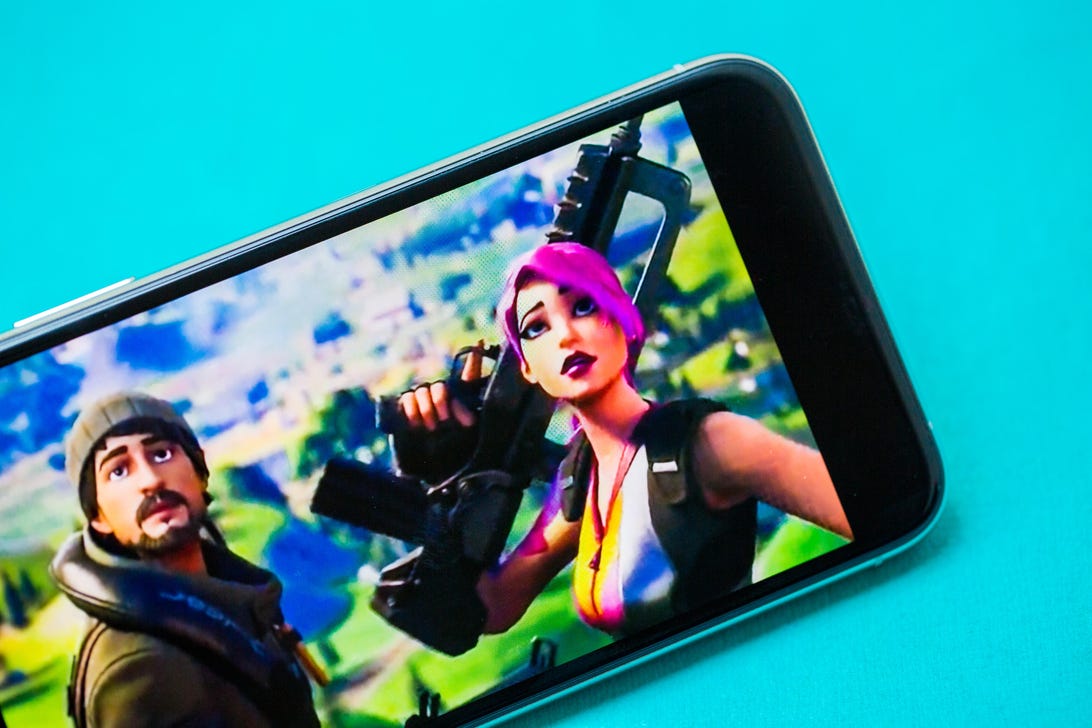
Sherlock and Watson, peanut butter and jelly, Netflix and chill. Since 2008, Apple has created that sort of inextricable link between its iPhones and its App Store. The company's "there's an app for that" ad campaign drew millions of people, who over the years have bought more than a billion iPhones. And since the App Store was the only place to get programs for the iPhone, millions of developers flocked to Apple too. Now the tech giant is facing questions about whether it's running a monopoly, forced into the topic by Fortnite maker Epic Games and Epic's lawsuit alleging an abuse of power.
On Monday, Apple will face off against Epic in a California court over a seemingly benign issue around payment processing and commissions. In short: Apple demands app developers use its payment processing whenever selling in-app digital items, like a new look for a Fortnite character or a celebratory dance move to perform after a win.
The iPhone maker says that using its payment processing setup guarantees security and fairness, and it takes up to a 30% commission on those sales in part to help run its App Store. Epic, however, says Apple's policies are monopolistic and its commissions too high.
On its surface, the lawsuit reads like a corporate slap fight about who gets how much money when we all buy stuff in apps. But the outcome of this case could change everything we know not just about the App Store, but about how mobile transactions work on other platforms like the Google Play store. It could invite further scrutiny from lawmakers, who are already looking at whether companies like Apple and Google wield too much power.
"This is the frontier of antitrust law," said David Olson, an associate professor who teaches about antitrust at the Boston College Law School.
What makes this case unusual, Olson said, is that it attempts to challenge how modern tech companies work. Apple touts its "walled garden" approach -- where it's approved every app that's offered for sale on its App Store since the beginning in 2008 -- as a feature of its devices, promising that users can trust any app they download because it's been vetted.
Aside from charging an up to 30% fee for in-app purchases, Apple requires app developers to follow policies against what it deems objectionable content, such as pornography, encouraging drug use, or realistic portrayals of death and violence. Apple also scans submitted apps for security issues and spam.
"Apple's requirement that every iOS app undergo rigorous, human-assisted review -- with reviewers representing 81 languages vetting on average 100,000 submissions per week -- is critical to its ability to maintain the App Store as a secure and trusted platform for consumers to discover and download software," the company said in one of its filings.
For its part, Epic has argued that Apple's strict control of its App Store is anticompetitive and that the court should force the company to allow alternative app stores and payment processors on its phones. "Apple is bigger, more powerful, more entrenched and more pernicious than monopolies of yesteryear," Epic said in an August legal filing. "Apple's size and reach far exceeds that of any technology monopolist in history."
Epic isn't the only company making this case. Music streaming service Spotify notably complained to European Union regulators, saying that Apple's 30% commission and App Store rules breached EU competition laws. On Friday, the EU's competition commissioner said that a preliminary investigation found "consumers losing out" as a result of Apple's policies. Apple will have an opportunity to respond to the commission's objections ahead of a final judgment on the matter. If it loses, Apple could be slapped with a fine of up to 10% of its annual revenue and be required to change how it applies fees to streaming services, at least within the EU.
Apple is also facing increasing scrutiny in the US, where lawmakers earlier in April held a hearing with representatives from the iPhone maker and Google, as well as from Spotify, dating app maker Match and tracking device maker Tile. During the hearing, both Spotify and Tile argued that Apple's moves were monopolistic. (They made similar arguments about Google too.)
If Apple loses its lawsuit with Epic, it could be forced to change how apps are distributed and monetized across its iPhones and iPads.
"I'll be really interested to see how much Apple argues, "This is our successful business model and this is what's at stake,'" Olson said. Judges are typically wary of completely upending a successful business on a theory that it could promote more competition and lower prices. But not always. "If you're a certain judge, you might say, 'Great! Let's do it,'" he added.
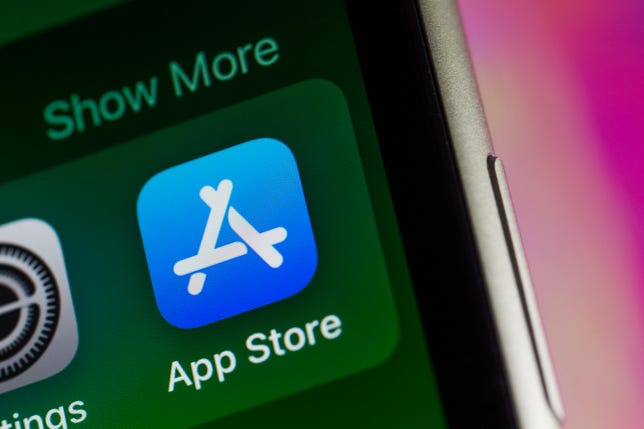
Apple's App Store helped make the iPhone what it is today.
Angela Lang/CNETMonopoly or not?
Legal experts and people behind the scenes of the trial say the hardest argument Epic will need to make is proving that iPhone users have been harmed by Apple's policies.
Antitrust laws in the US outlaw "every contract, combination, or conspiracy in restraint of trade," according to a summation of the rules written by the Federal Trade Commission, which oversees many of the antitrust issues for the US government. Antitrust laws also outlaw "monopolization, attempted monopolization, or conspiracy or combination to monopolize." The FTC notes that a key part of judging these issues is is whether a restraint of trade is "unreasonable."
In the Apple case, that translates to its payment processing. Epic, and other critics, say Apple's requirement that developers use its payment processing is in itself monopolistic.
Apple argues that its commission is fair, and thus the payment processing structure isn't unreasonable. Apple has kept its 30% commission consistent since the App Store's launch in 2008, and the iPhone maker says industry practices before then charged app developers much more. Furthermore, it hired a team of economists to help prove its practices aren't anticompetitive.
In their report, the economists Apple hired said commission rates lower "the barriers to entry for small sellers and developers by minimizing upfront payments, and reinforce the marketplace's incentive to promote matches that generate high long-term value." They didn't look into whether the fees stifle innovation or are fair, concerns that Epic and other developers have raised.
Agitating change
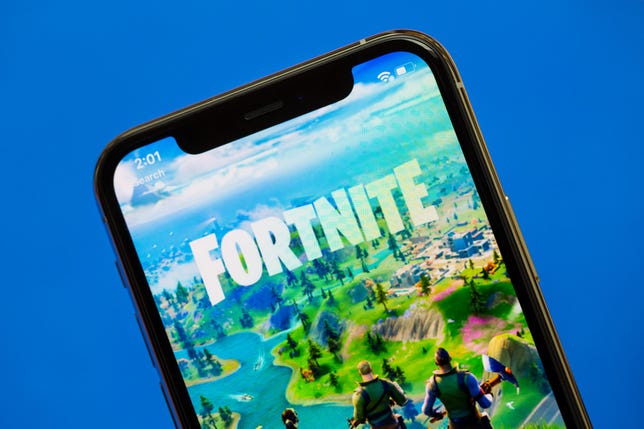
Fortnite is one of the most popular games ever made.
Angela Lang/CNETUp until last year, Apple and Epic appeared to have a good relationship. Apple invited the software developer on stage at its events to show off games like Project Sword, a one-on-one fighting game later called Infinity Blade.
But Epic wasn't just a popular developer. It also began pushing the industry for change. In 2017, Epic briefly allowed Fortnite players on Sony's PlayStation and Microsoft's Xbox to compete with one another. This was a feature Sony in particular had resisted with other popular games, like Rocket League and Minecraft. So when Epic removed the function, players blamed Sony and began a social media pressure campaign against the company. Sony relented a year later.
In 2018, Epic opened its Epic Games Store for PCs, a competitor to the industry-leading Valve Steam store. Its key feature was charging developers 12% commission on game sales, far below the industry standard of 30%. Epic also paid for exclusivity rights to highly anticipated games, forcing gamers to use its store to play highly anticipated titles like Gearbox Software's sci-fi shooter Borderlands 3, Deep Silver's postapocalyptic thriller Metro: Exodus and the epic story game Shenmu 3.
Gamers, though, bristled at the move. They didn't like having to install another app store to get access to some of their games. They complained that Epic's store didn't have social networking, reviews and other features they preferred from Valve's store. And now they'd have to go through all that if they wanted to buy these hot new titles.
"I wish there were a more popular way to do this," Tim Sweeney, Epic's CEO, said in a 2019 interview with CNET. But a survey by the Game Developers Conference, released just before our interview, underscored Sweeney's point, finding among other things that a majority of game developers weren't sure Valve's Steam justified its 30% cut of revenue. "I feel like the ends are more than worth the means," Sweeney said.
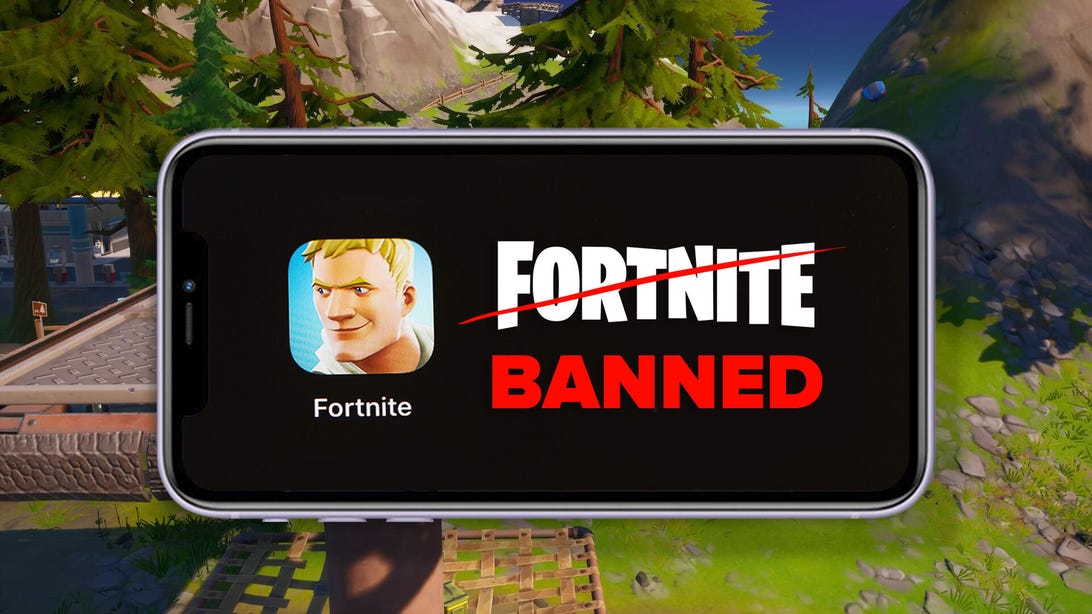
Apple iPhone and iPad owners haven't been able to download the game since last August.
CNETProject Liberty
Epic's next target was big. In 2019, the company convened executives, lawyers and public relations experts to plan a public fight with Apple. Epic wanted to run its own app store and payment processing on the iPhone, according to documents filed with the courts. Epic even gave the initiative a name: Project Liberty.
To help make its case, Epic planned to lower the price for Fortnite's "V-Bucks" in-game currency, which people used to buy new looks for their characters and weapons. It prepared a hashtag campaign, #FreeFortnite. And it helped form an advocacy group, the Coalition for App Fairness.
Epic also devised a marketing push, with a video reminiscent of Apple's famous Super Bowl ad, which, in a tech-inspired spin on George Orwell's novel 1984, had painted the original Macintosh as the savior. Now, though, Epic cast Apple as the evil Big Brother.
The project was organized in secret, according to depositions filed with the court. Epic "didn't want anybody -- Apple notwithstanding, anybody, users included, to -- to understand that we were thinking about doing this until we decided to actually pull the trigger," David Nikdel, lead of online gameplay systems for Epic, said in his testimony. Project Liberty was on a "need-to-know basis."
Early on Aug. 13, Sweeney sent an email informing Apple it would no longer adhere to Apple's payment processing restrictions, and turned on hidden code that allowed users to buy V-Bucks directly from Epic for a 20% discount. Epic made the same move with Google too, and both companies swiftly removed Fortnite from their respective app stores that day. Though Epic sued both companies in response, the Project Liberty marketing campaign was squarely aimed at Apple.
"Epic Games has defied the App Store Monopoly. In retaliation, Apple is blocking Fortnite from a billion devices," Epic wrote in its ad, called Nineteen Eighty-Fortnite and posted to YouTube. "Join the fight to stop 2020 from becoming '1984.'"
Messy fight
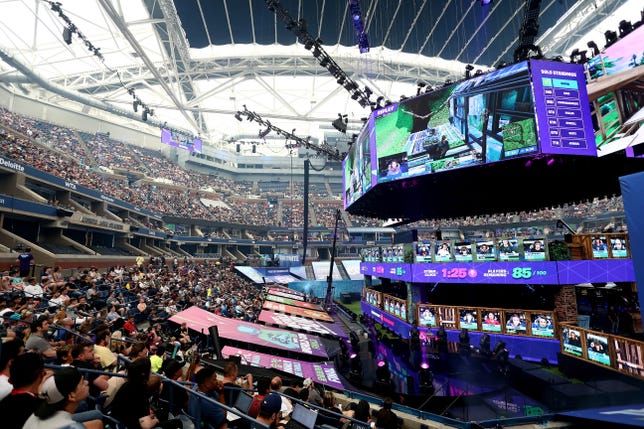
Before the pandemic, people filled stadiums by the thousands to watch Fortnite competitions.
Getty ImagesApple's and Epic's case is being argued before a judge, in a "bench trial," and not before a jury. US District Judge Yvonne Gonzalez Rogers, who's overseeing the case, has indicated she's closely read the filings and learned the technical sides of Apple's and Epic's arguments. As a result, both camps are likely to dive into the legal weeds much faster than they would with a jury, whose members would need to get up to speed on the law and the details behind the case.
No matter the decision, it's almost certainly going to be appealed. And in the meantime, regulators, lawmakers and competitors will be watching closely to see how much Apple's and Epic's arguments could shape new approaches to antitrust.
"Concerns regarding anticompetitive behavior among tech companies are being heard worldwide," said Valarie Williams, a partner with law firm Alston & Bird's antitrust team, in an analysis of the case. "While the outcome of Epic Games v. Apple is not expected to rewrite the nation's antitrust laws, it could be the tip of the iceberg."
With so much on the line, the companies could consider settling before a judgment is handed down. But people connected to the lawsuit don't think that'll happen, in part because there isn't much middle ground between the two companies' arguments.
Apple could lower its payment processing fees, which it's already done for subscription services and developers who ring up less than $1 million in revenue each year.

Apple frequently points to its App Store as a key selling point of the iPhone.
James Martin/CNETBut allowing another payment processing service onto the iPhone could be a first crack in Apple's argument that its strict App Store rules are built for the protection and trust of its users. If app developers could use any payment processor they wished, why couldn't they use different app Stores too?
Epic has also argued that price isn't the only issue it's focused on. The company wants to choose technologies it uses in its Fortnite game as well.
That's all why industry watchers say they expect the case to continue. Both Apple and Epic are large, well funded and notoriously obstinate.
"It's easy to say it's David vs. Goliath, but this is like Goliath vs. Godzilla," said Michael Pachter, a longtime video game industry analyst at Wedbush Securities. "Tim Sweeney is a moral, ethical and quite opinionated person who genuinely believes he's right, and will tilt at windmills because he's convinced he's right and it's the right thing to do."
Pachter predicts Apple's argument around security of payment processes won't hold up, considering Epic already successfully takes payment for V-Bucks on its own website and platforms. And when it broke Apple's rules, Epic didn't try to become a payment processor for games from other companies. Epic only tried to sell the same V-Bucks it offers for Fortnite on PCs and game consoles.
"Tim did not say you can come into the Epic store and buy Clash of Clans currency or Candy Crush currency or whatever else," Pachter added. "He was offering Epic currency."
Epic's lawsuit against Apple is set to begin Monday, May 3, at 8:30 a.m. PT/11:30 a.m. ET. The audio of the in-person courtroom proceedings will be carried live over a teleconference, and chosen pool reporters will be in the room.
CNET will be covering the proceedings live, just as we always do -- by providing real-time updates, commentary and analysis you can get only here.
Article From & Read More ( Apple's battle with Fortnite could change the iPhone as we know it - CNET )https://ift.tt/3nDWgVn
Business
Bagikan Berita Ini















0 Response to "Apple's battle with Fortnite could change the iPhone as we know it - CNET"
Post a Comment